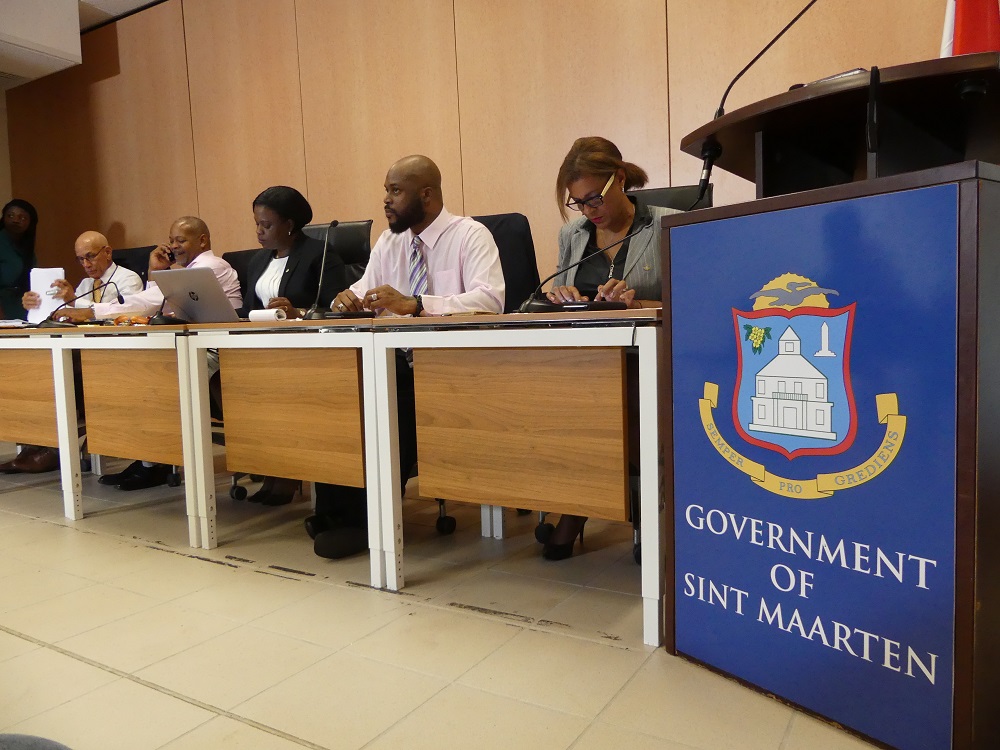Government discusses salary cuts for ministers and parliamentarians

PHILIPSBURG – The Council of Ministers approved the draft 2018 budget on Wednesday morning and its now on its way to the Council of Advice, the Board financial supervision (Cft) and the General Audit Chamber for scrutiny and comment. Minster Mike Ferrier (Finance) expects a speedy advice process that will enable the Parliament to approve the budget by May 1.
Ferrier said that the adjusted budget has brought down the deficit from 257 to 250 million guilders. “That is still a huge amount and I ask everybody to do his fair share to reduce our costs.”
Personnel costs for 2018 are 190.8 million guilders, almost 40 percent of the budget. Yet, the Council of Ministers is not thinking about cutting the salaries of its civil servants.
The minister listed a number of alternatives that begin at the top with a reduction in salaries for all ministers and to adjust the bridge-allowance – the payments ex-ministers are entitled to up to two years after leaving office.
“Based on the number of changes in government we’ve had in the past seven years, the island really cannot afford this,” Ferrier noted.
The travel and accommodation allowances for ministers and members of Parliament is also under the microscope. “These ideas may not make a tremendous difference but we must lead by example,” Ferrier said.
The minister also talked with the top of the United Democrats about a possible reduction in remuneration for parliamentarians. Ferrier spoke in particular with MPs Theo Heyliger, Sarah Wescot-Williams and Chanel Brownbill about this issue.
If the UD gets all its faction members on board, this measure seems a done deal, because Wycliffe Smith’s St. Maarten Christian Party has made lowering those salaries part of its political manifesto. Eliminating the bridge-allowance for ex-parliamentarians is also part of the current discussions.
To put measures that may affect civil servants into perspective, Ferrier highlighted post-Irma experiences from the private sector. “The private sector immediately felt the impact of Hurricane Irma on September 7 of last year,” he said. “Every business was affected; some were destroyed, some were half-destroyed.”
Without mentioning his company (NAPA) by name, Ferrier said that at his automotive company he had invited all employees to discuss the way forward. “Do we still have a job? Will you stay open? That were the first questions. I said, let’s do this together and make it with less for each of us. Otherwise we’ll have to close down or let some people go.”
NAPA’s offer to its staff was a voluntarily reduction in salary of 50 percent. “I am proud to say that my employees all said: sure.”
The minister pointed out that there are still hotels that are closed, hotels where people lost their job and their income, and places where work schedules were reduced to a couple of days. “Businesses on Front Street closed immediately. So many people in the private sector lost their income. Government workers on the other hand never missed a beat. Every employee got paid every month like clockwork.”
Another issue under consideration is to freeze the bonuses for civil servants. “We have a shortage of cash and that is going to get worse because hotels are closed and the economy is not up to speed,” Ferrier said.
The list of cost-saving topics – under discussion but not approved yet – eyeballs many more options, like replacing cell phone packages by prepaid arrangements, the reduction of office rent from third parties, limiting the waste of electricity and office supplies and car pooling.
“We need to understand that these are not normal times ladies and gentlemen,” Ferrier said. “These are tough times. To open the door of government every day is costing us 40 million guilders every month. There are two myths. One: the government cannot go broke; and two: the government can print more money. But we cannot print any money and our economy is hurting so we cannot collect as much money as we’d like.”
Ferrier called on every civil servant to come up with cost cutting suggestions. “Be part of the solution.”
























